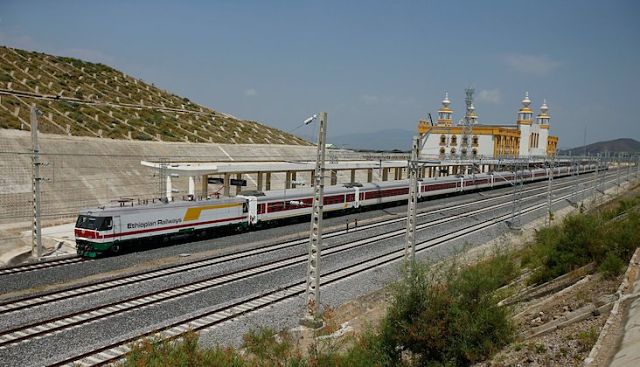 A train passes through the Adama train station of the Addis Ababa-Djibouti railway. (REUTERS/Tiksa Negeri)
A train passes through the Adama train station of the Addis Ababa-Djibouti railway. (REUTERS/Tiksa Negeri)
The Africa Report
After eight years of stalemate, Ethiopia resumed its World Trade Organization (WTO) accession process in January.
Ethiopia’s transition to liberalism is fairly recent, having started in the 1990s. And the country’s launch of the process to join the WTO in 2003 is fully in line with this trend.
While the previous government was willing to negotiate on trading goods, it was very reluctant to open up the services sector to privatization and foreign investment. This stalled the negotiations. The current administration is more enthusiastic about implementing a more liberal economic policy.
Ethiopia was the fastest-growing economy in 2017 according to the World Bank, yet its debt has been rising sharply, from more than 47% of GDP in 2014 to 61% in 2018. “We have borrowed significantly for infrastructure projects that have really not achieved the expected results,” Ethiopia’s finance minister Eyob Tekalign told parliament in 2019.
The development model implemented by former prime minister Meles Zenawi was supposed to pay for the debt through export revenue. It is a difficult plan to implement in a continuing period of political turmoil. It was in this context that Prime Minister Abiy Ahmed came to power in 2018.
Reforms needed
Under constant pressure from the World Bank and the IMF, the Abiy administration has adopted radical reforms to move to a market economy. Included in the new policy is the privatisation of key sectors such as telecoms with Ethio Telecom, air transport with Ethiopian Airlines, banking and logistics. These reforms have enabled it to resume negotiations with the WTO.
By adhering to a system of binding rules and thus guaranteeing reform, Ethiopia wishes to encourage foreign investment. At the local level, the government says that WTO membership will provide the private sector with better market access.
“We want to be rule-makers, not rule-takers,” said Geremew Ayalew, minister counsellor at Ethiopia’s permanent mission in Geneva recently. “Ninety-eight percent of world trade is between WTO members. If we claim our economy is compatible, we have to prove it.”
As a reminder, in 2018, Ethiopia’s exports totalled $2.4bn, with the United States ($372m), China ($329m) and Saudi Arabia ($186m) as its main destination markets. As for the goods exported, they include coffee ($836m), oilseeds ($363m) and cut flowers ($232m).
Imports amounted to $8.3bn. They were mostly for the acquisition of airplanes, helicopters and/or spacecraft ($659m), gas turbines ($418m) and packaged medicines ($320m). The imports were sourced largely from China ($2.5bn), France ($722m) and India ($713m).
—
Related:
Ethiopia Prepares for Partial Privatization of Ethio Telecom
Join the conversation on Twitter and Facebook.

























